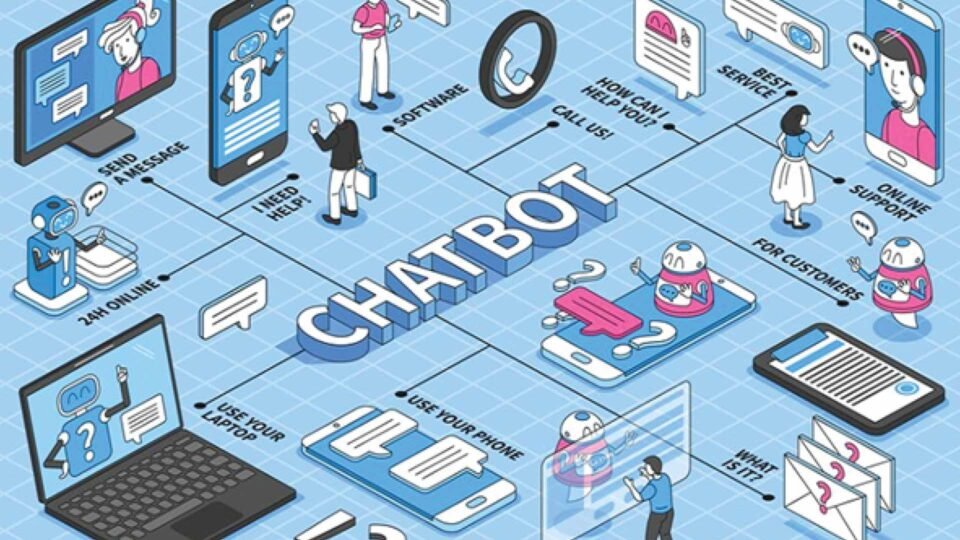Unlock the potential of AI-driven chatbots in revolutionizing business operations. Explore how these virtual agents enhance productivity and customer interactions.
Chatbots, powered by artificial intelligence (AI), are fundamentally changing how businesses operate and enhancing productivity and efficiency. Chatbots are computer programs designed to simulate conversation with human users via text or voice. From simple FAQ bots to complex virtual agents, chatbots are automating business processes and transforming how companies interact with customers and employees. The industry is still at the nascent stage but holds great promise and potential for the future.
In this post, we’ll explore the key ways chatbots are improving business productivity and efficiency.
1. Streamlining Customer Interactions
One of the biggest impacts of chatbots on business has been streamlining and automating customer service and support. According to Juniper Research, chatbots will deliver over $10 billion in global cost savings by 2024. Chatbots powered by natural language processing (NLP) can understand customer questions and requests, and then provide immediate answers without human involvement. This reduces customer wait times and frees up staff to focus on higher value work.
Chatbots like those from IBM Watson, Bold360, and LivePerson are providing 24/7 automated assistance across industries. Customers today expect quick, convenient service. Chatbots deliver by integrating with websites, apps and messaging platforms to engage customers in real-time, whenever and wherever they need help. ChatGPT has revolutionized the chatbot industry with its innovative approach of handling large language models and coming out with responses even to the complex questions that hitherto had not been seen. Google’s bard too is not far behind. It is going to be the battle of chatGPT vs Google Bard in coming years. Both would want to dominate the industry and that perhaps will lead to develop the solutions for any shortcomings that we see today.
2. Enhancing Employee Productivity
From HR and IT help desks to project management and internal communications, chatbots are assisting employees and improving productivity. Repetitive administrative tasks and company policy questions are ideal applications for AI chatbots in the workplace. Employees get quick answers to common issues, freeing up HR and IT to tackle more strategic work. Chatbots make it easy for businesses to automate and outsource tech support taking the help of technology to handle queries from the customers and even in-house staff.
Intelligent chatbots act as virtual assistants, helping employees with tasks like booking travel, submitting expense reports, and setting up meetings. Through automation and conversational AI, they provide an intuitive way for staff to get things done quickly. Leading companies like Airbnb, Spotify, and Mastercard are implementing workplace chatbots to streamline communication and workflows.
3. Driving Business Efficiency
As AI systems, chatbots continuously improve through machine learning. They utilize data from past interactions to deliver ever more accurate responses and perform tasks more efficiently over time. Natural language interfaces allow chatbots to understand context and intent, engage in complex dialogue, and complete tasks just as a human assistant would. Companies are leveraging the technology to come up with optimal marketing strategies with AI and chatbots. These strategies help companies reach a wide customer base and scale new heights of business growth.
From customer service agents to sales reps and administrative staff, chatbots are taking on roles humans performed in the past at lower cost and with higher consistency. They don’t need holidays, sick days, or coffee breaks. For many routine, repetitive tasks, chatbots simply offer a more efficient alternative. Intelligent chatbots are providing tremendous ROI through increased productivity and cost savings. But there are still domains where chatbots can’t function properly. Human touch and help are required in the form of on-demand tech support for various things like cybersecurity, cloud, office printer setup, computers, and network help. It is better to look for the human mind and hands when requiring help in these core business domains.

4. Transforming Customer Experience
Today’s customers expect ultra fast, personalized, and seamless experiences. Intelligent chatbots provide a superior level of convenience by serving customers anytime, anywhere at the pace they expect. With NLP and machine learning, chatbots analyze customer data and past interactions to make recommendations and tailor experiences to individual needs and preferences.
Chatbots are revolutionizing industries from e-commerce retail to banking and travel. They minimize wait times, reduce human errors, and allow staff to focus on higher value functions like complex problem solving and building customer relationships. By streamlining the customer journey, chatbots drive satisfaction, loyalty, and revenues.
5. Improving Business Agility
Since they are software-based, chatbots can be quickly updated with new capabilities, integrations, and information. Companies can test variations of chatbots to optimize performance. This means they can rapidly deploy new automated solutions to improve the customer experience. With traditional customer service models, it could take weeks or months to train staff on new policies or programs. With chatbots, changes can be made instantly. Their flexibility enables businesses to be far more nimble.
6. Generating Actionable Data Insights
Unlike human agents, chatbots capture every interaction, enabling rich data collection. With customer permission, conversations can be recorded and analyzed. Using AI and analytics, businesses can gain data-driven insights to better understand customers and continually refine chatbot capabilities. Transcripts reveal how customers express needs, surface new topics and trends, identify areas for improvement and more. Chatbots provide a wealth of actionable metrics on customer behavior and intent. Data analytics drive optimization and maximize the business value from chatbot investments.
Conclusion
From large enterprises to smaller businesses, chatbots are fundamentally changing how companies operate; enhancing productivity, efficiency, and the customer experience. By automating repetitive tasks and processes, chatbots enable staff to focus on more meaningful, revenue-driving work. With intelligent self-learning capabilities, chatbots will only expand their capabilities and business value over time. Its clear conversational AI is transforming engagement across industries, delivering tangible returns on investment, and driving competitive advantage.
Visit AITechPark for cutting-edge Tech Trends around AI, ML, Cybersecurity, along with AITech News, and timely updates from industry professionals!


